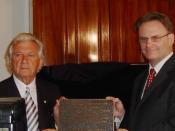Robert Hawke has been regarded as one of AustraliaÃÂs popular and effective prime ministers after the post-war period. His government carried out many social and economic reforms, and also developed AustraliaÃÂs growing relationship with Australia. Many of his Labor governmentÃÂs actions and reforms have successfully contributed to the growing development of Australia in economic, social and cultural terms.
The development of Australia during HawkeÃÂs era was done so through economic stability and reforms. His Labor government had attempted to restructure the countryÃÂs economy through many actions such as wage restraint, encouraging private sector growth, increasing productivity and reforming infrastructure for businesses. During this period, there were many significant actions that his government took. These had included establishing a national health scheme (Medicare), lowering marginal tax brackets, saving the Franklin Dam, and creating ATSIC.
One of the major policies that were implemented by HawkeÃÂs government was the Accord. This was a landmark agreement between the government and the ACTU to practise wage restraint to encourage growth in employment, and to also reduce inflation.
The Accord introduced flat rates of wage increase(s) by no more than 4%. These would then be negotiated between unions and employers. Reforms were also introduced to help families cope with the financial pressure, and it included the social wage. However, the Accord had very limited success. Although inflation remained under a low 2 percent, the other economic aspects emphasises the lack of success from the Accord. Real wages had dropped by 10 per cent in value, and unemployment remained high (11 per cent in 1992). Furthermore, interest rates hit a record high (17%). These factors meant that ordinary Australians faced economic hardship.
Another policy that HawkeÃÂs Labor government had introduced was the National Economic Summit. In 1983, he organised this summit, and invited key community members to promote co-operation. This meeting was aimed at developing consensus between employers, trade unions and employees. Delegates assessed the economy, industrial relations and strategies for recovery. The conference achieved some outcomes, and two groups were formed to develop strategies and monitor progress. They were the Economic Planning and Advisory Council (EPAC), and the price Surveillance Authority. It also contributed to government policies on prices and incomes.
Medicare was also another policy that the government during HawkeÃÂs period of office had launched. Medicare is Australia's publicly-funded, universal health scheme, providing affordable treatment by doctors and in public hospitals for all citizens and permanent residents. The federal government had proposed to fund 85 per cent of all health costs. This re-establishment of Medicare (previously known as Medibank) was introduced in 1984. The Hawke Government reversed many of the Fraser GovernmentÃÂs changes, and this change in title also reflects the introduction of what can be considered the current Medicare system.
BibliographyAustralia in the 20th Cenury working historically . Mark Anderan Paul Ashton





